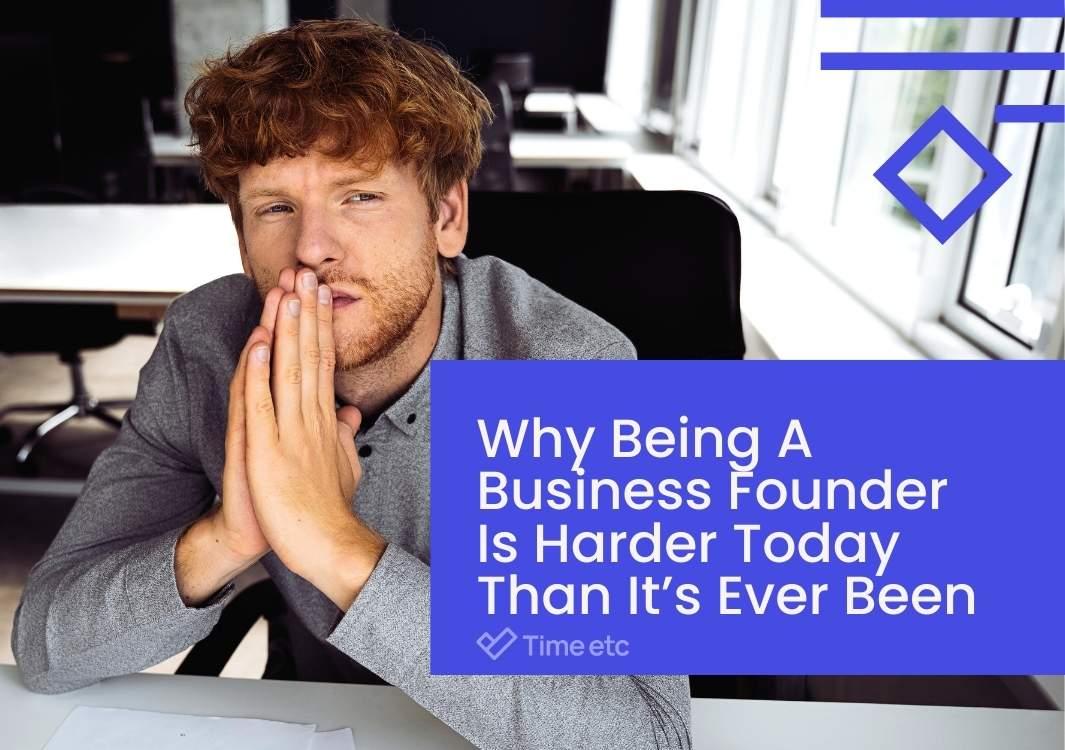Starting a business has always carried challenges. Every founder throughout history has had to wrestle with uncertainty, risk, and responsibility.
But today, the statistics are telling a shocking story. Nearly half of all founders say they’re thinking about walking away this year. Around 88% are battling at least one mental health challenge, and burnout has become the norm rather than the exception. These figures point to a crisis that goes beyond normal business growing pains.
So, what's going on?
To answer that, we need to look at just how dramatically the founder’s role has changed.
Then vs. now: Demands and expectations
A generation ago, running a business was a very different experience. A founder’s job was demanding, but the focus was clearer and more contained. You needed to know your product inside and out, nurture your relationships with your customers, and keep your finances in check. The pace was steadier, competition stayed mostly local, and the tools for running a business were fairly simple.
Today, the role of a founder has expanded in every direction. The list of skills you’re expected to master seems endless, and the pace and pressure are higher than ever.
Beyond knowing your product, you are now expected to:
- Master digital marketing across multiple platforms and channels.
- Keep pace with constantly changing social media algorithms.
- Monitor performance through CRMs, analytics dashboards, and reporting tools.
- Understand logistics, shipping, and automation systems that keep everything moving.
- Create and manage your own branding, PR, and content strategy.
- Navigate a growing maze of finance, tax, and compliance tools.
The truth is, no one person can possibly be an expert in all of these areas. And the digital world knows it. In fact, it’s thrived on it. These days, anyone with a blog, podcast, or social media account can call themselves an expert, offering endless “solutions” to every challenge you face.
One article insists that a certain sales framework will guarantee growth. A podcast swears their own formula is the silver bullet for scaling businesses. LinkedIn voices insist that they’ve unlocked the secrets to rapid success.
With so many voices shouting at once, often contradicting one another, it's easy to second-guess yourself before you even begin. Should you pivot your strategy because of that thread you read this morning? Is your approach completely wrong because it doesn't match what worked for that other founder's completely different business?
Reality check: The modern business environment has created an impossible standard. No founder can be an expert in everything. Believing you should be creates guilt and exhaustion.

Then vs. now: Communication
With the digital revolution came grand promises of freedom and flexibility. We were told technology would streamline our lives and give us more time for what truly matters. Yet for many of us, the opposite is true. Communication has now become another full-time job in itself, a relentless, round-the-clock demand that governs our daily lives.
Back in the 1970s, the average executive received roughly 1,000 messages throughout an entire year. Fast forward to today, and that same professional faces more than 30,000 messages. That’s a thirtyfold increase in volume, with the same number of hours in the day, and the same human brains trying to process it all.
Founders in the pre-digital era had something that feels rare now: a clear separation between work and personal life. When the office lights were switched off, the workday truly ended. Evenings belonged to family, friends, and hobbies. Weekends offered real rest and a chance to recharge before Monday rolled around.
These days, work follows you home in your laptop bag, buzzes in your pocket during dinner, and lights up your nightstand while you sleep. Our devices make it possible for clients, employees, and partners to reach you anytime, anywhere. And when you’re always reachable, you’re never truly off. Your brain never gets the chance to fully rest and recharge when there's always another message waiting, another notification demanding attention.
Reality check: Modern founders now face thirty times more messages than their predecessors. Trying to handle it all leads to constant exhaustion, fractured focus, and a workday that never really ends.

Then vs. now: Distractions
Distraction has quietly become one of the biggest forces shaping modern business ownership.
For pre-digital-era founders, interruptions came in the form of a ringing phone or an unexpected knock at the office door. Today, it’s a completely different story. Modern founders face demands and distractions that simply didn’t exist 20 years ago.
Emails arrive every few minutes, phones buzz with calls and texts, Slack and Microsoft Teams pings throughout the day, and notifications from your favorite websites tempt you to dive back in.
Every alert, every buzz, every notification pulls you away from what you were currently doing, and getting back on track takes more mental energy than we realize. Even when notifications are silenced, the mind carries the weight of knowing there are messages waiting to be answered and updates waiting to be checked. That constant background pressure makes it so much harder to sink into the deep, focused work where strategy, innovation, and real growth are born.
The cruel irony here is that many of these digital tools were originally designed to make business simpler and more efficient. Instead, they've spawned an entirely new category of complexity that we must somehow navigate. The mental energy required to manage notifications, stay current across multiple platforms, and process the relentless stream of digital information has become a significant business challenge all by itself.
Reality check: You can’t build a thriving business if you live in constant reaction to digital noise. You can have the best strategy in the world, but if you lack the focus and uninterrupted time to execute it, your vision will never become a reality.

Then vs. now: Support
Go back a few decades, and you'd find most business founders surrounded by a small army of support staff. Secretaries handled the phone calls. PAs managed schedules and travel arrangements. Administrative assistants took care of filing, data entry, and all the other routine tasks in the background. Having that kind of help was viewed as standard, even essential, for running a business well.
Walk into most startup offices (or peek into a founder's home office) today, however, and you’ll see a very different story. On top of their roles as strategist, salesperson, product designer, marketer, accountant, customer service, and so on, most founders are also their own assistants.
The evolution and increased accessibility of technology have played a huge role in convincing us that we can do everything ourselves. That it’s not only possible, but preferable. This culture around self-sufficiency has become so strong that harnessing support feels like weakness, laziness, or indulgence.
This shift feels almost punitive when you really think about it.
From day one, pre-digital-era founders knew that their most valuable contributions came from focusing their time, energy, and unique strengths where they mattered most. They weren’t trying to master every task or stretch themselves across every corner of their operations. They were crystal-clear about the fact that building something meaningful required a thoughtful use of resources, including other people’s expertise.
The old saying of “just work harder” feels almost comical once you realize that our days are full of tasks that used to be someone else's responsibility.
Reality check: Today’s founders have more on their plates than ever before, with less support than ever before. Can one person spread thin really achieve the same results as a whole team?

What this means for modern founders
The combined weight of these modern pressures has led to a silent crisis in entrepreneurship. The numbers tell a sobering story about the personal cost of building a business today:
When the founder's well-being suffers, the company's health is at risk. This is reflected in the harsh reality of business survival rates.
And that’s the real tragedy: so many of these failures may be preventable. When founders are spread too thin, juggling endless responsibilities while stressed and exhausted, even the most promising businesses can collapse under the strain.
What's the bottom line?
Here’s the truth: you’re not imagining it. Building a business today feels nothing like the stories we grew up hearing. Your grandfather’s grocery store, your mentor’s consultancy—neither had to master fifteen different digital platforms just to get it off the ground, battle constantly shifting algorithms, or worry about Google reviews making or breaking their reputation overnight.
The playbook that guided earlier generations doesn’t carry founders as far as it once did.
No founder, no matter how talented or resourceful, can carry the full weight of modern demands on their own. You didn't start your business to become a prisoner to it. You started it to create something meaningful, to solve real problems, and yes, to build the life you wanted. That vision is still possible, but it requires letting go of the myth that you have to do it all alone.
Hiring support is not something you must earn by reaching a breaking point. It’s not a luxury reserved for when your business hits certain milestones. Support is essential from the moment your time is pulled away from the work only you can do—the work that fuels growth, sparks ideas, and inspires others to join your mission.
So the question becomes less about if you need help and more about when you will give yourself permission to step into it.
Imagine how much lighter things could feel if you had reliable support starting next week. What projects would move forward more quickly? What space would open up in your calendar, your energy, your mind? The change begins the moment you decide that your time and well-being are worth protecting.
Ready to take back control and tip the odds back in your favor?
Yes, being a founder today is harder than it's ever been. But you have access to tools and resources that previous generations of entrepreneurs could never have imagined.
Here at Time etc, we've helped over 22,000 founders and executives escape the endless cycle of admin, distractions, and overwhelm that's stealing their focus from what truly matters. We match busy founders like you with skilled, experienced virtual assistants to take care of all the tasks that keep you stressed, scattered, and stuck.
The last thing you need is another complicated process eating up your time. That's why we've made everything simple and stress-free:
- No hiring headaches—We handle all the sourcing, screening, and vetting.
- Get started fast—Have a skilled assistant ready to go in just 1-2 days.
- Stay focused—We manage all your assistants’ HR and admin so your time is spent where it matters most.
- Keep costs low—Up to 90% less than hiring in-house.
- Total flexibility—Add, reduce, or adjust support as your needs change.
Speak to our expert team to let us know what you need, and we’ll handle the rest.
P.S. Want $150 off your first month of virtual assistant support? Answer a few quick questions to get personalized task recommendations and unlock your welcome discount.











